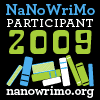YES!!!!! I "WON"!!! I wrote 50,000 words this month for National Novel Writing Month (NaNoWriMo)!!!
Last year I started the story of Rebecca Phillips, Ph.D. in English Literature, a Milton scholar who, after being a life-long evangelical, becomes acquainted with the ancient Anglican Church, the Church of England founded around 37 AD. As a practicing poet and scholar of English poetry from the time period of the inception of the original Book of Common Prayer in 1549, Rebecca becomes passionate about the beautiful prayer book and a more ancient faith, to the point that she shares what God has revealed to her with her evangelical church at their women's retreat. The novel's time scope is a six-month period between mid-September and Easter, where the novel finishes. A rather staid, set-in-her-ways person, Rebecca's theological world is turned on its ear, and she learns to change and adapt to God's revelations to her.
I wrote the first half of the book during NaNoWriMo '08, and although I completed my 50,000 words last night, the story is still not yet finished. I skipped the Ash Wednesday/start of Lent chapter(s) and have barely started on the last two chapters which will cover Holy Week; the book will end with Easter, the celebration of the resurrection of Christ. The book right now is soooooo autobiographical that I left all of the characters' names the same as they are in real life. After I complete the rough draft, I'll go back through and change the names to protect the not-so-innocent. :)
However, I started down the wrong path as I picked the novel up this month. Thinking I needed some action and conflict, I wrote about Rebecca being physically attacked while on a walk in her neighborhood. She is rescued from probable r*ape by an elderly African-American woman who recognizes the two men -- and they are caught as a result. However, they get out on bail through a technicality and swear that they'll finish what they started. Rebecca lives in fear of these men and stays with the Anglican priest and his wife for a few days while the police try to gather evidence to put the two back in jail. She learns to trust God and finds the joy she experiences in the liturgy to be healing her of hatred and fear toward these two men.
It was a good story, but as I wrote more and more of it, I realized that it wasn't MY story. I was getting farther and farther from my original premise, and was very much removed from the first half of the book. Well into the month, I turned over 50 pages of writing to a yellow font (so I could still count the words for NaNoWriMo) and restarted on page three of this month's work. And it was the best decision I could have made.
As I continued the story in the second half of the month, I saw a shape slowly emerge. I knew where I was heading, and I knew where I would end the tale. An outline formed, and I saw very clearly what this novel would be and how I would get it there. For someone who hasn't written fiction since college (and sucked at it then), this emerging shape was a thing of beauty and awe to behold.
I doubt I'll ever publish this book, even if I do finish it. It's my personal tale of discovering the breadth, depth, width, and heighth of the ancient Anglican Church, and writing it as fiction gave me the freedom to play with it a little. I still hope to write a nonfiction book on the value of liturgy for evangelicals, but that will require extensive research and far more time than I can devote to the project at present. Some day, perhaps.
But for now I'm just thrilled that I finished another NaNoWriMo challenge! My hope is that I will actually work on this draft rather than letting it grow mold until the next NaNoWriMo rolls around, as I did after last year's challenge. That would be really nice....






































